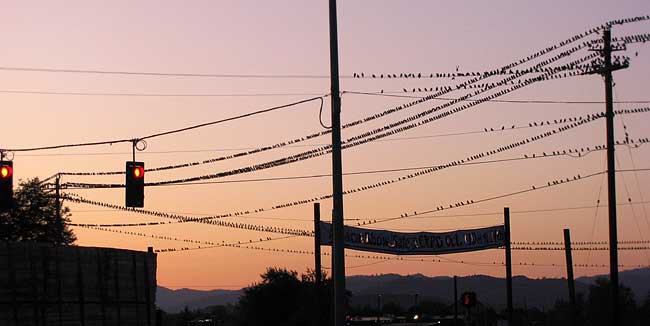Excerpts from Jim Conrad's
Naturalist Newsletter

from the the October 11, 2009 Newsletter, an On-the-Road Edition:
STARLINGS AT THE REST STOP
Last Monday afternoon Roland and Anita dropped me off at the Greyhound Station in Grants Pass, Oregon. Two hours later I was on a bus pulling into a fast-food resting area just off I-5, at Central Point Station. The sun had set, leaving a pink glow on the western horizon and a chilly feeling in the air. When I got off the bus to stretch my legs I saw what's shown above.
Hundreds of Starlings, STURNUS VULGARIS, the abundant invasive species introduced from Europe, perched on nearby power lines. I couldn't hear over the traffic's roar but I'll bet they were calling loudly with their strange, unmusical whistles and chatters.
Suddenly all the birds rose into the sky, leaving the lines oscillating up and down as if a heavy load of ice had just fallen off. The birds formed an ink-blot in the sky that circled the area, several times diving and soaring back up, fragmenting into two or three flocks, then merging into one big one again, like a graceful amoeba. The flock's boundaries were finely defined by hard-flying birds keeping exactly shoulder-to-shoulder with their companions, and I tried in vain to see who the leaders were, and especially to figure what the cue was that enabled them all to suddenly dive and soar in such perfect unison.
I was so engrossed that I simply forgot to take a picture of them pirouetting there in the pink sky. Then suddenly they all dove but this time they didn't veer back skyward, but rather flew full speed directly into a tall, dense planting of Bradford Pear trees beneath powerful halogen lights beamed downward from atop outlandishly tall poles. Other flocks who'd forgone the sky-waltzing flew fast and low from other trees and power lines into the same Bradford Pears, and who can say how so many Starlings could fit inside such a small grouping of trees?
A while I stood, reflecting how like the Starlings in their pink sky my own life has been, sometimes leaving whole big chunks of what and who I am behind, a lifestyle at once manifesting a certain penache, but in the end still just diffuse fluttering within well-defined boundaries, boundaries which from the inside you can't even make out.
from the August 17, 2006 Newsletter, issued from Polly's Bend, Garrard County, in Kentucky's Bluegrass Region:
A STORM OF STARLINGS
Last month when I conducted my traditional July 4th bird census Starlings were not among the 48 species listed. Still, this week one morning a whole cloud of Starlings flew past me as they skipped from hilltop pasture to hilltop pasture. When landing in the green grass the throng seemed to melt into the earth. But soon the whole ameba-like cloud with its well defined edges rose en masse again, expansively sky-stretching and folding upon itself and pirouetting, and then landing elsewhere, again being absorbed into the grass.
The Starling cloud wasn't black like those seen in soggy winter cornfields, but rather gray. In fact, at my distance the binoculars showed each bird to be so pale that for a moment I couldn't believe that they were Starlings. But then I confirmed the beak and body shape, saw how they walked instead of hopped, and I heard typical Starling snarls. And it is true: A juvenile Starling is gray and when its black feathers emerge they are tipped with white, causing the plumage to be strikingly speckled -- white dots on a field of black. A very interesting photo of a young starling with its head and chest retaining the pale juvenile plumage while the rest of the body is black with conspicuous white speckles can be seen at http://www.rivernen.ca/bird_19.htm.
"Post-juvenile" starlings of the kind that flew past me this week, no longer dependent on their parents, join into large, noisy flocks. The flocks disperse to places where inexperienced youngsters can easily feed, such as fallow fields, orchards, and our pastures. Flocking permits more efficient feeding, since each bird can be less vigilant, depending on the likelihood that if a predator should arrive at least someone in the great flock will notice it and sound the alarm.